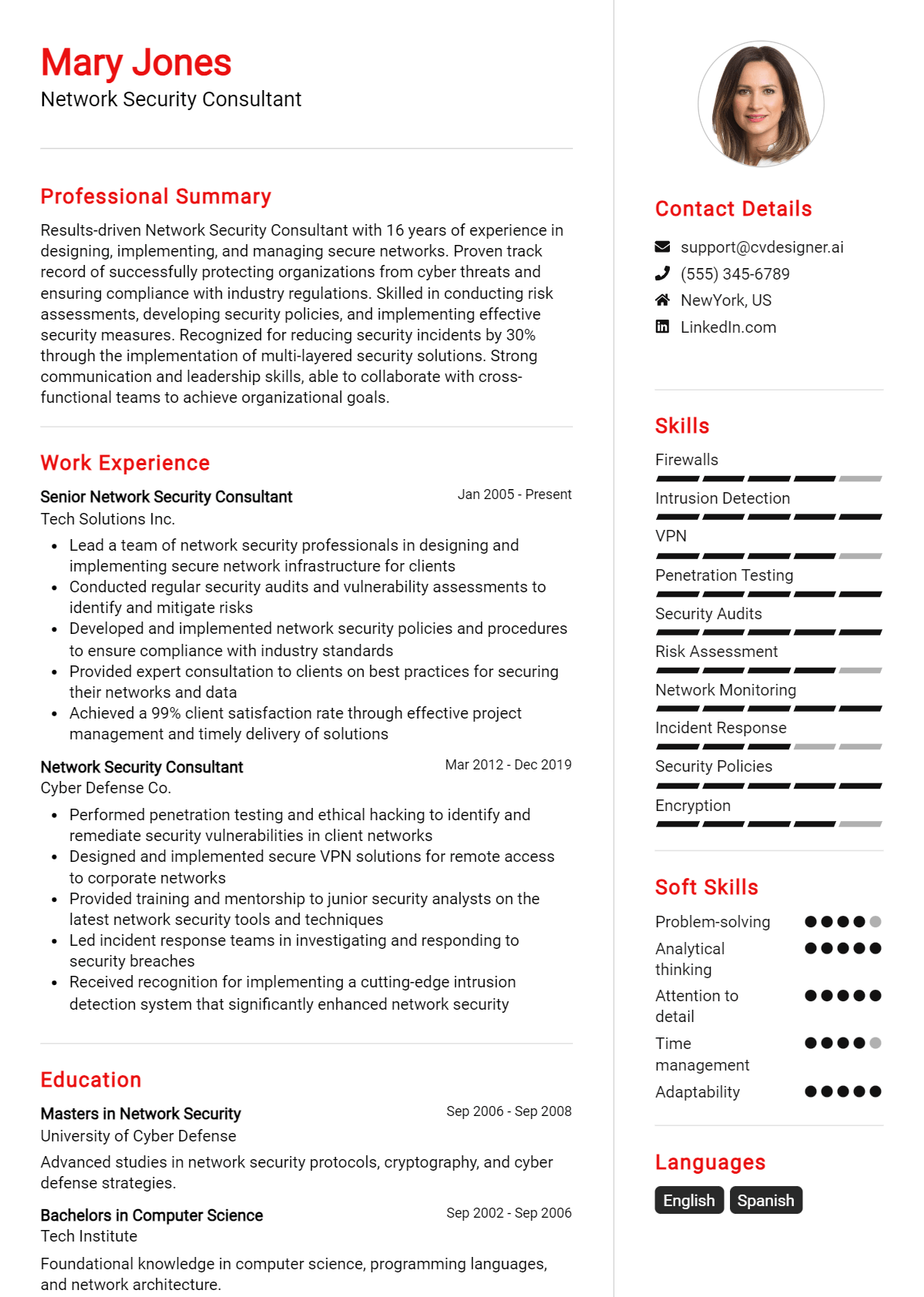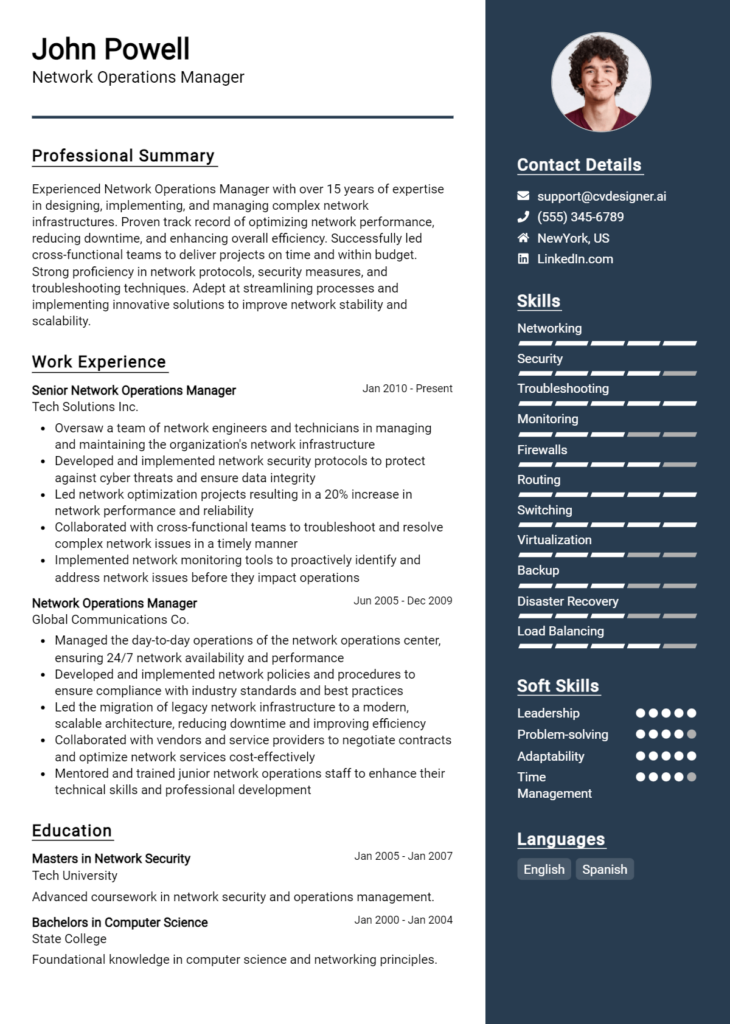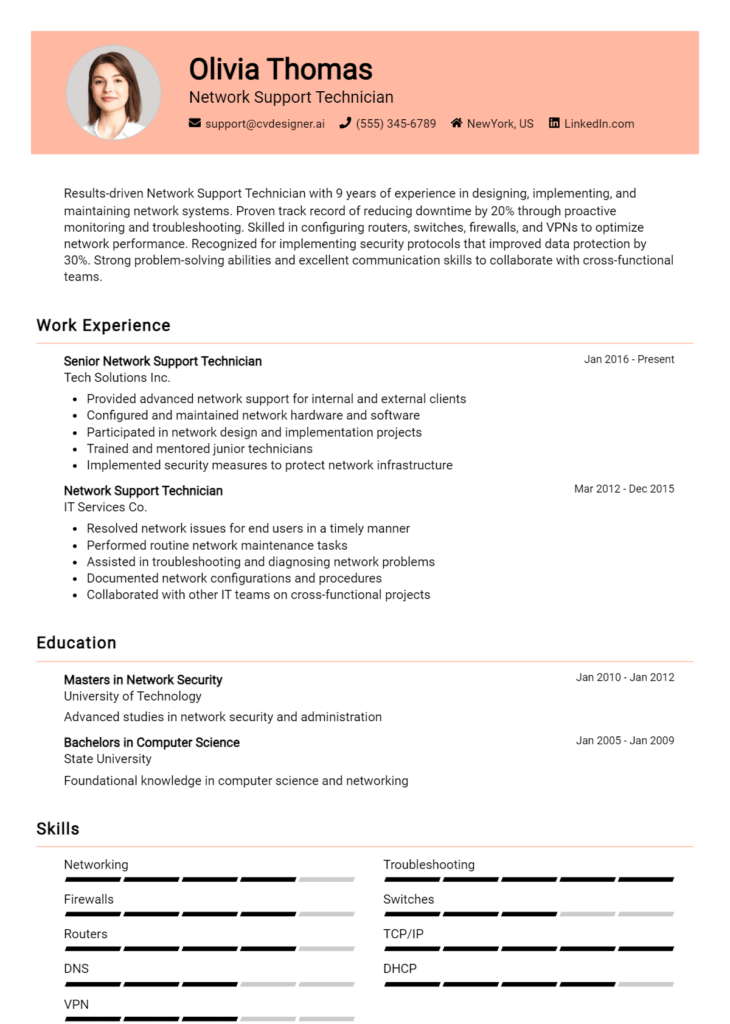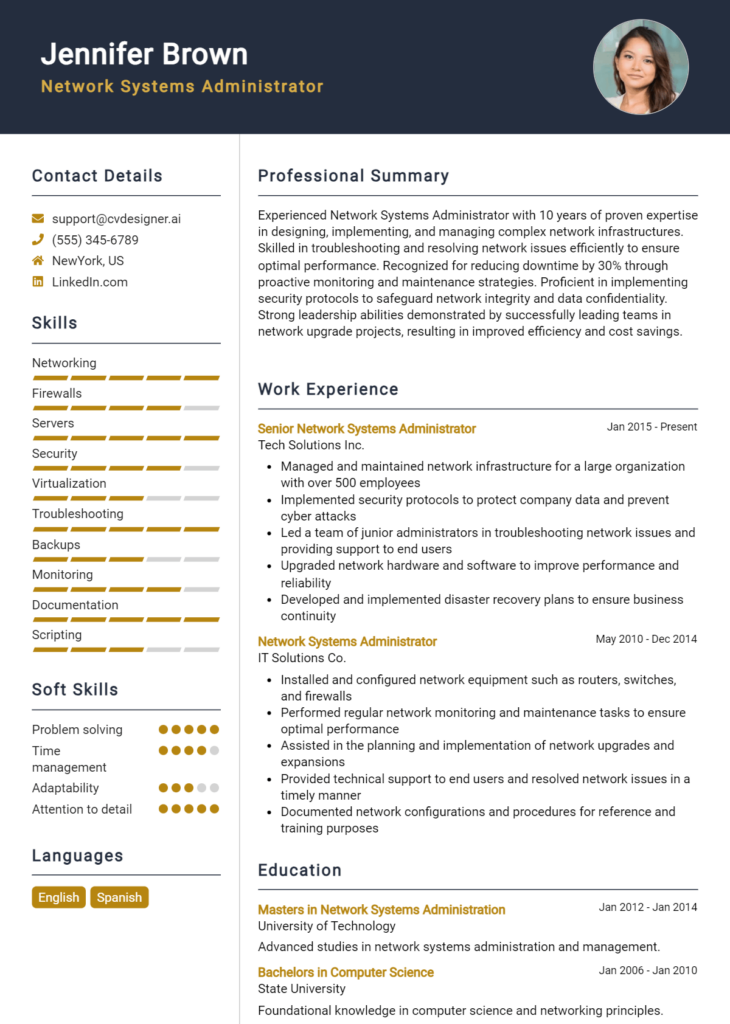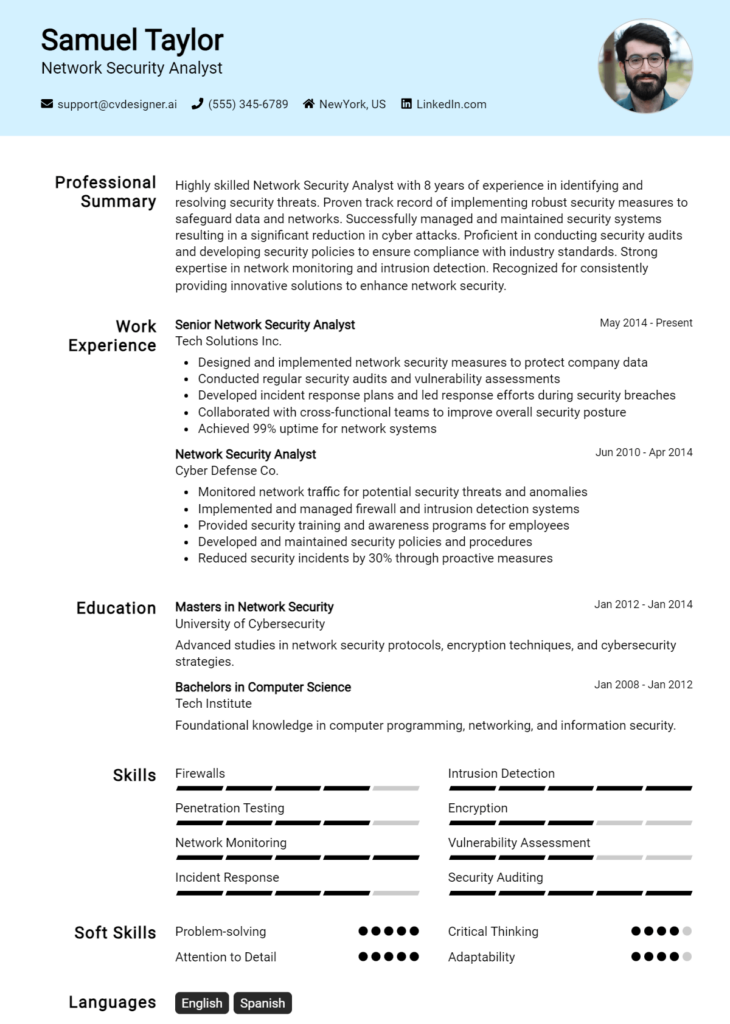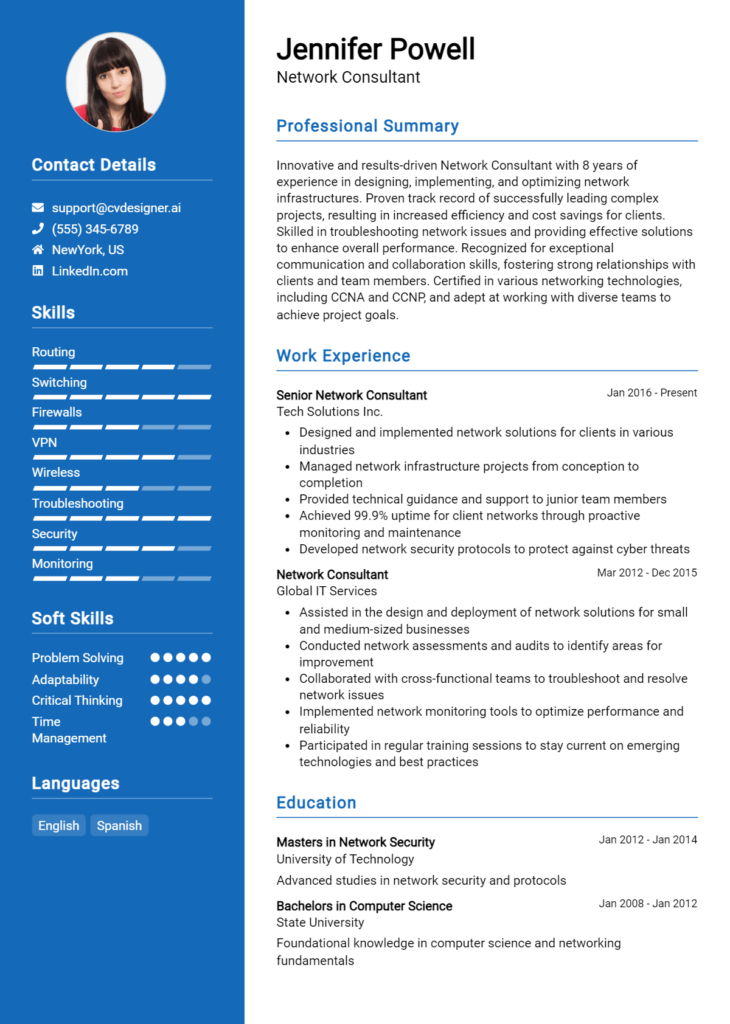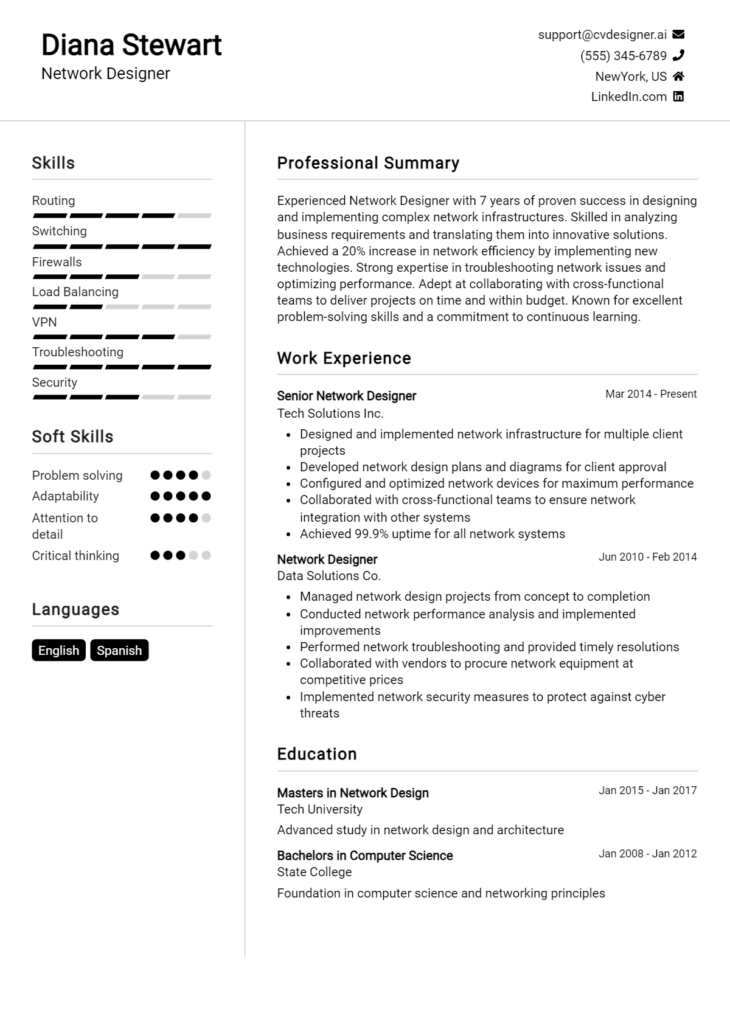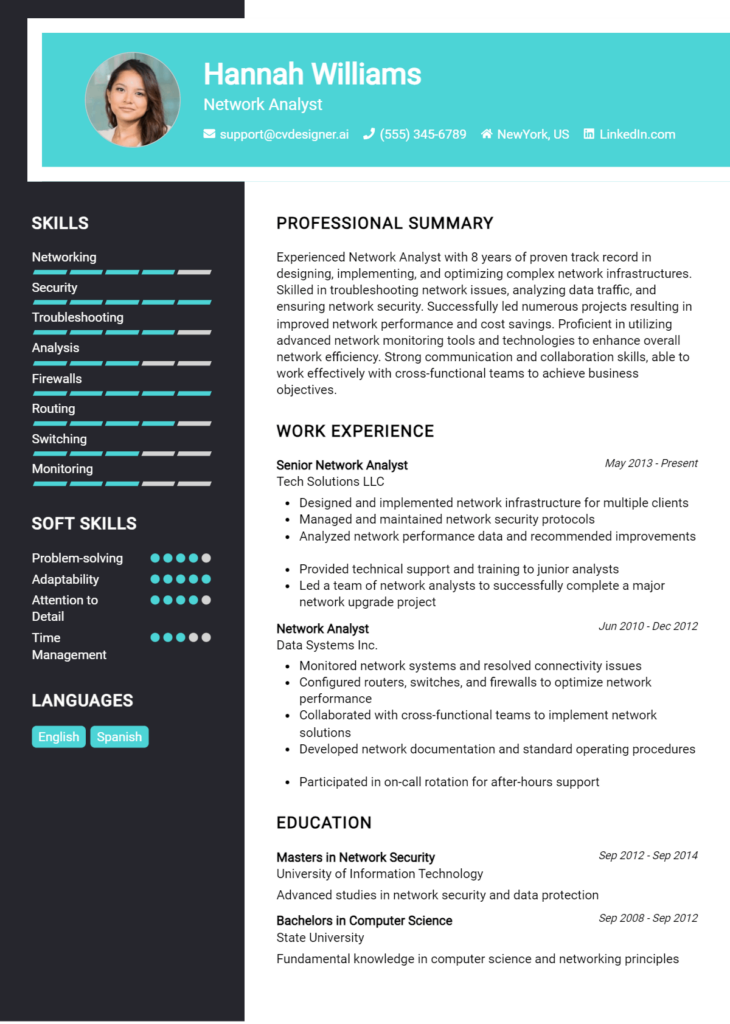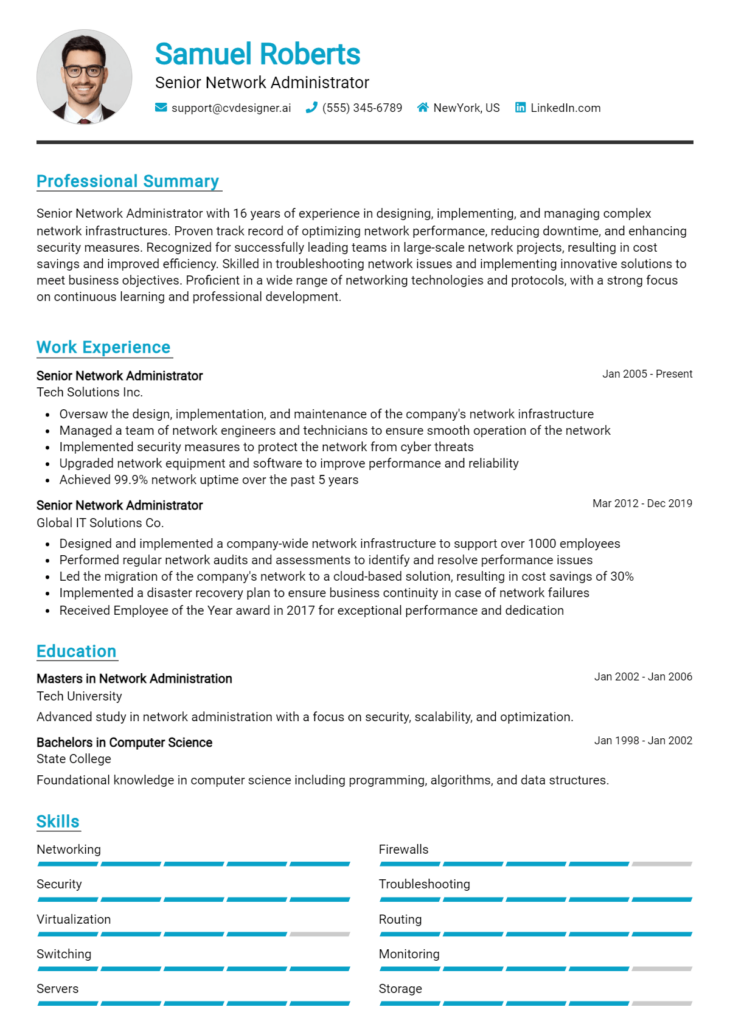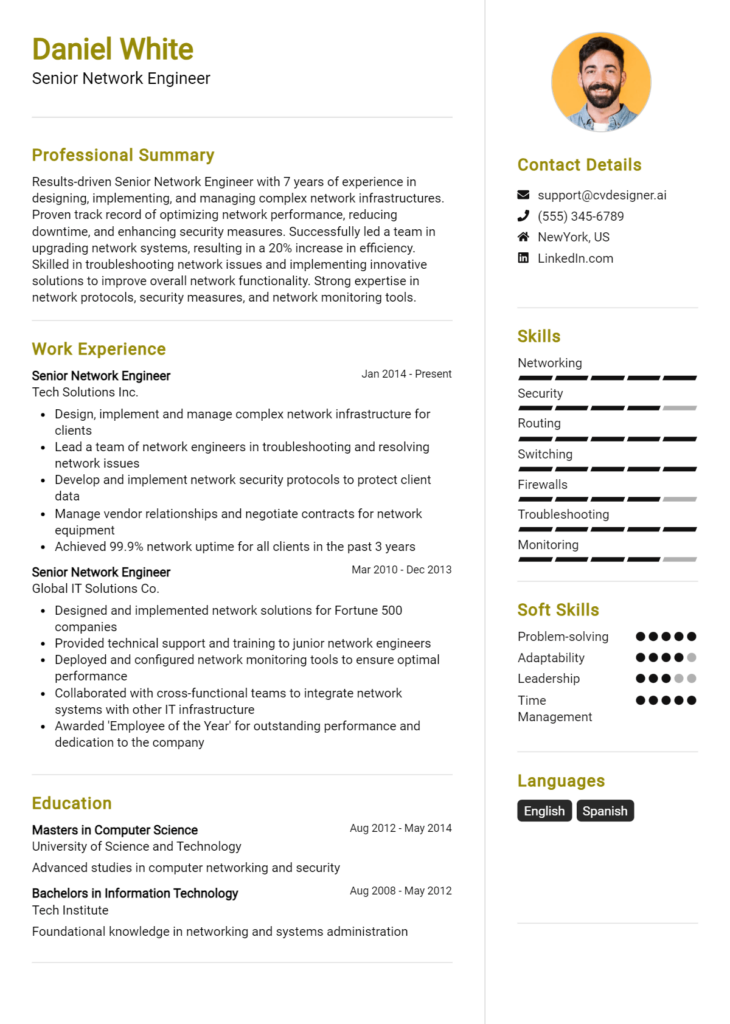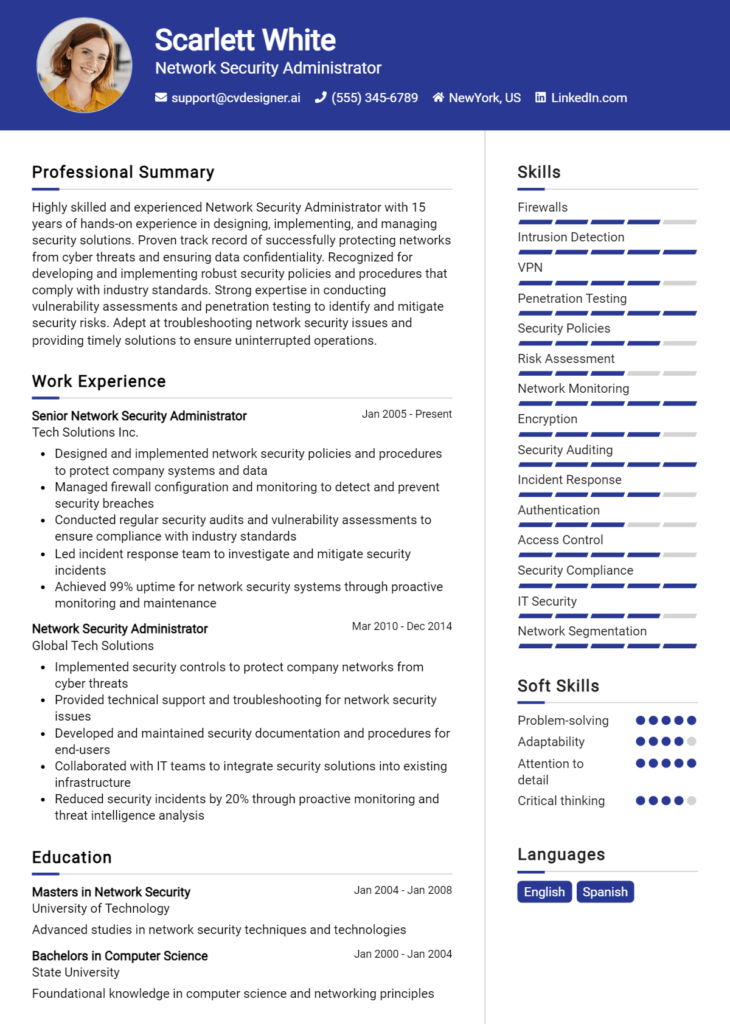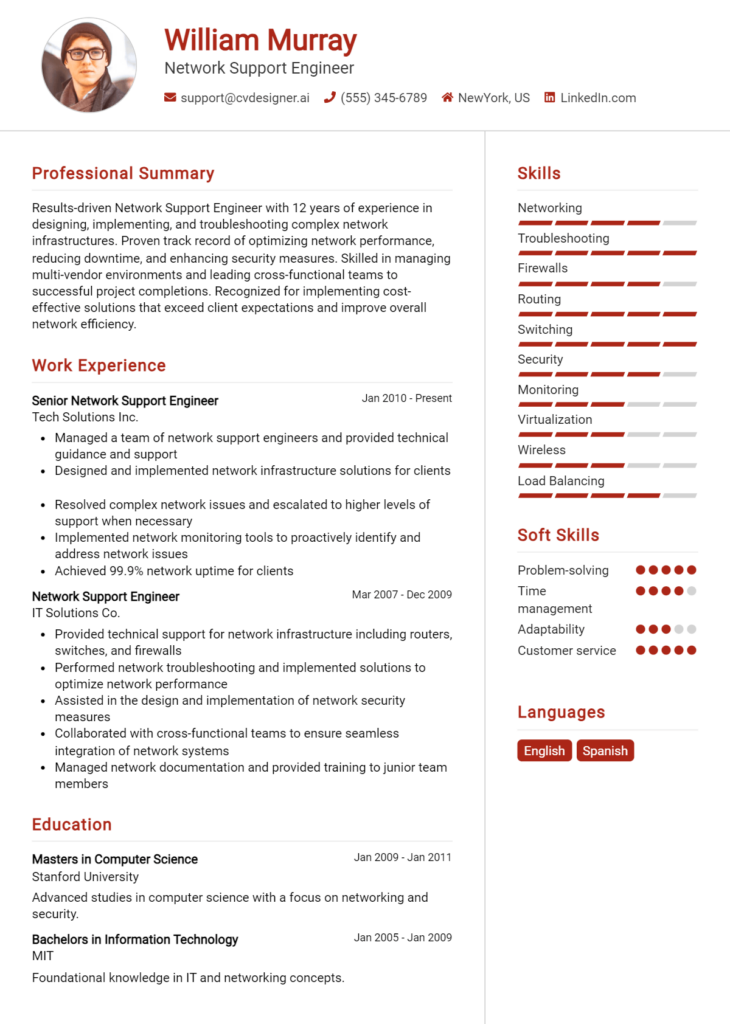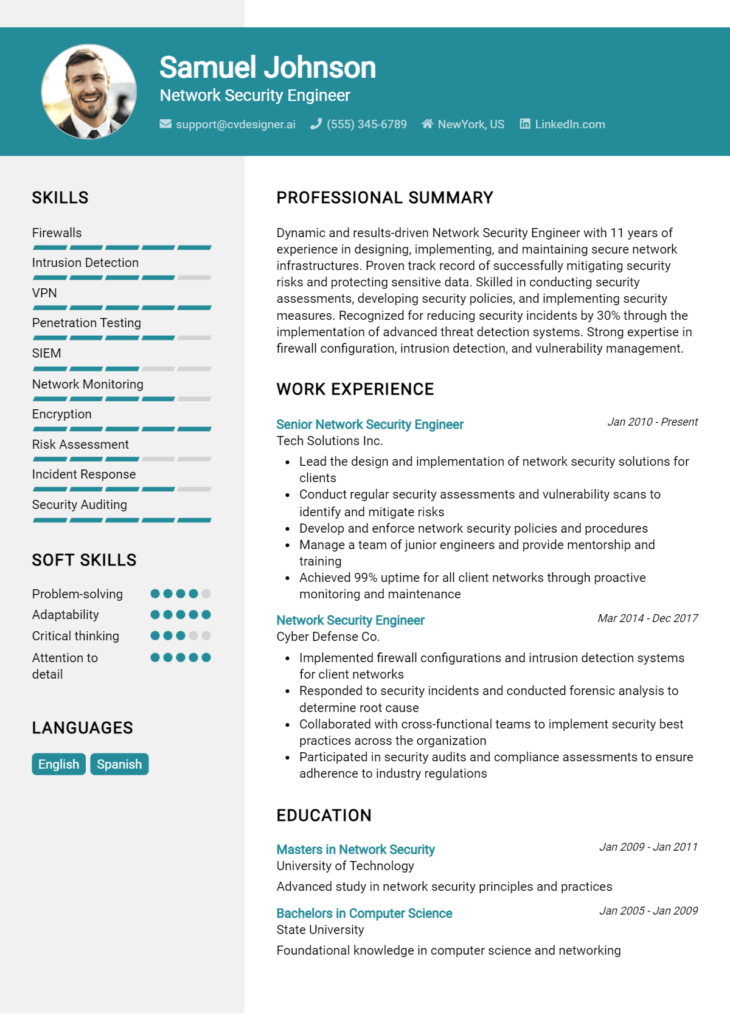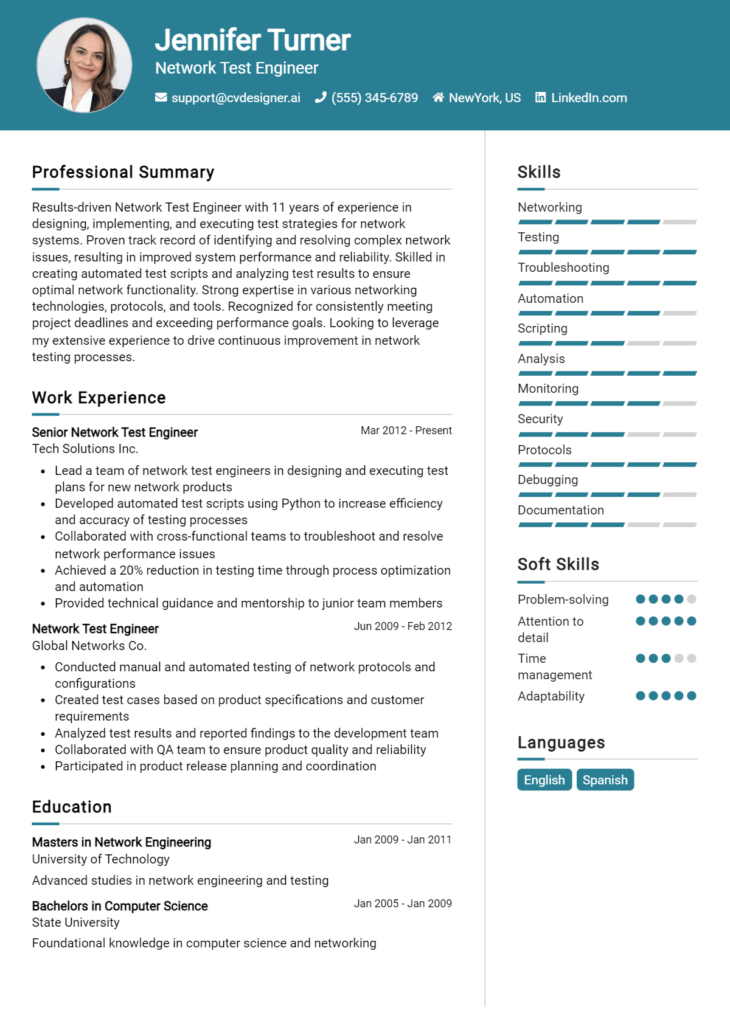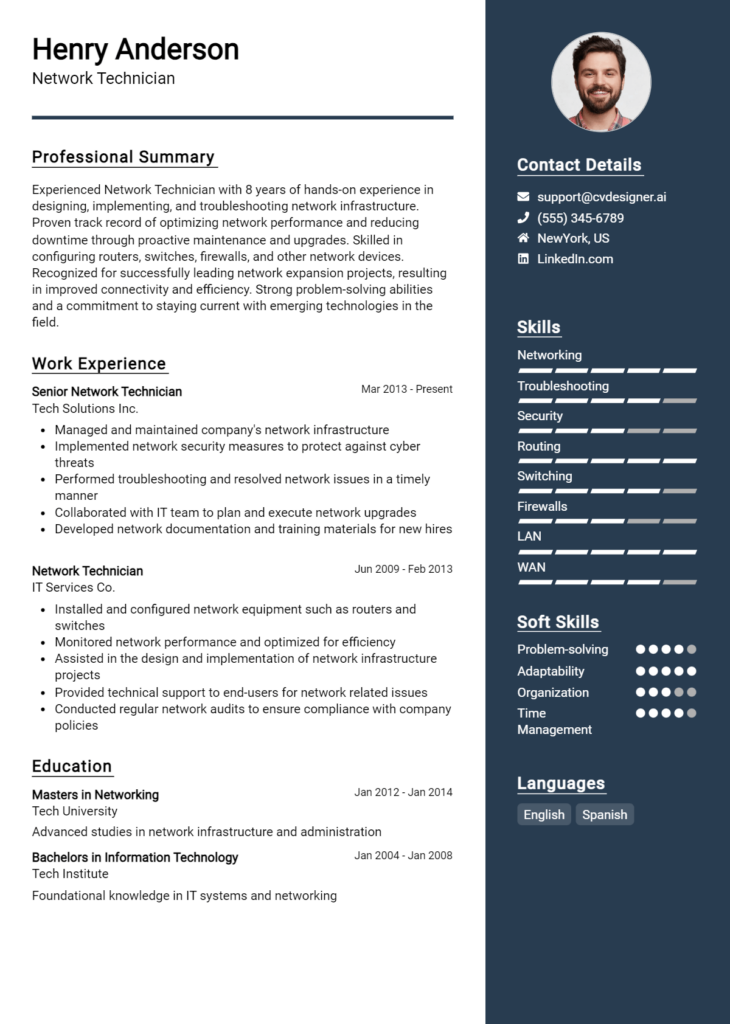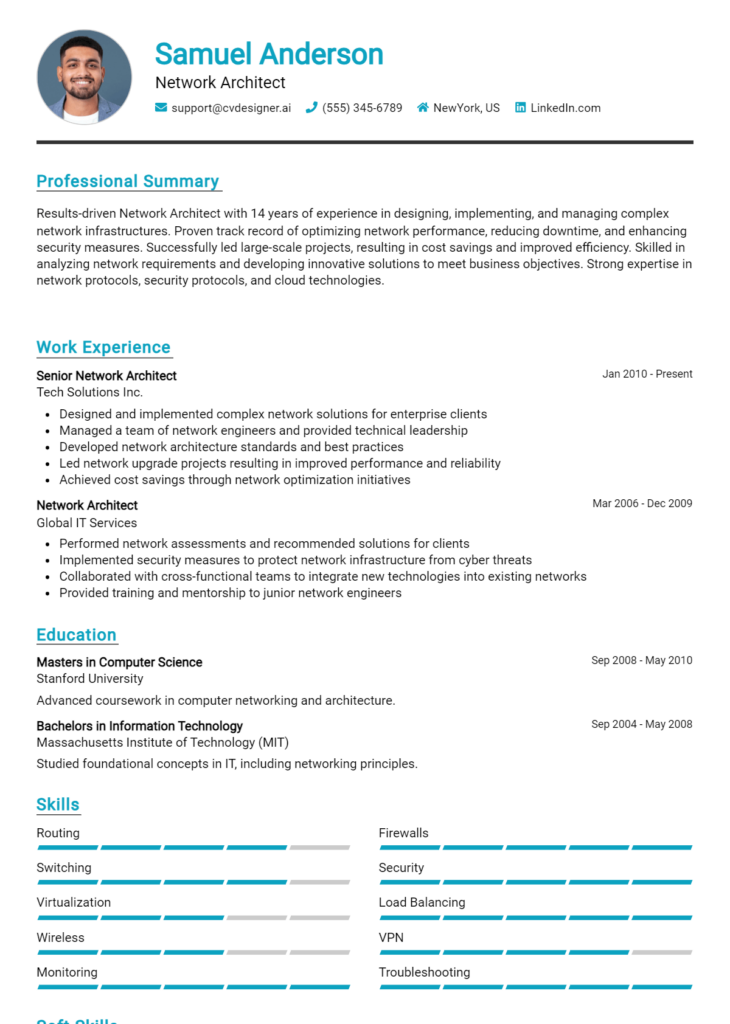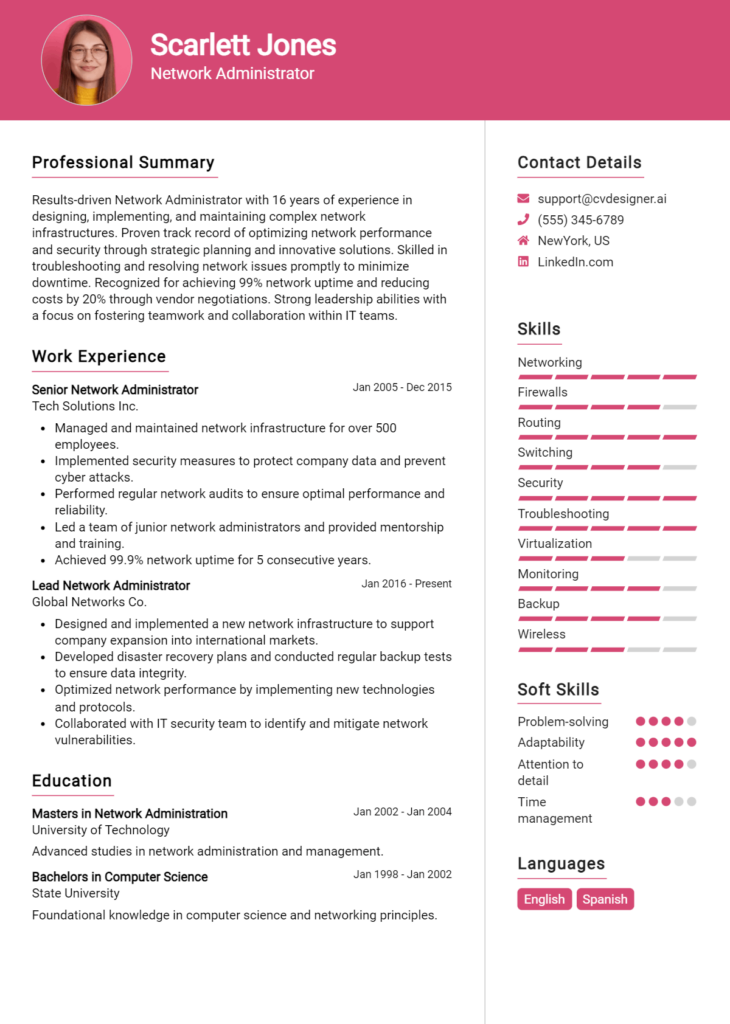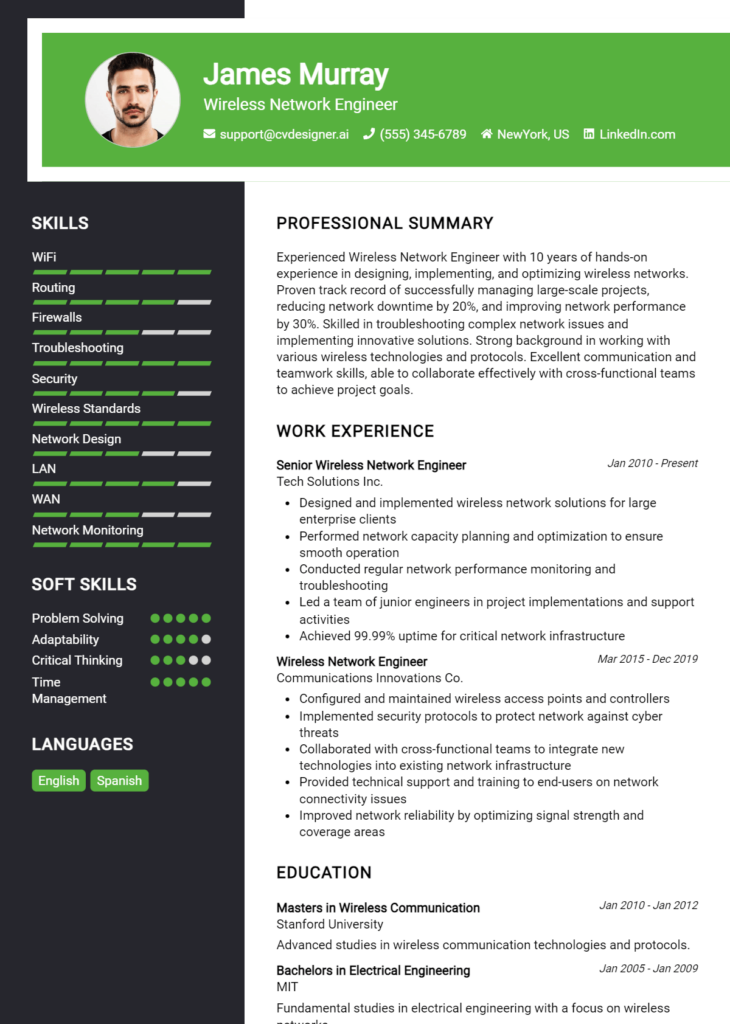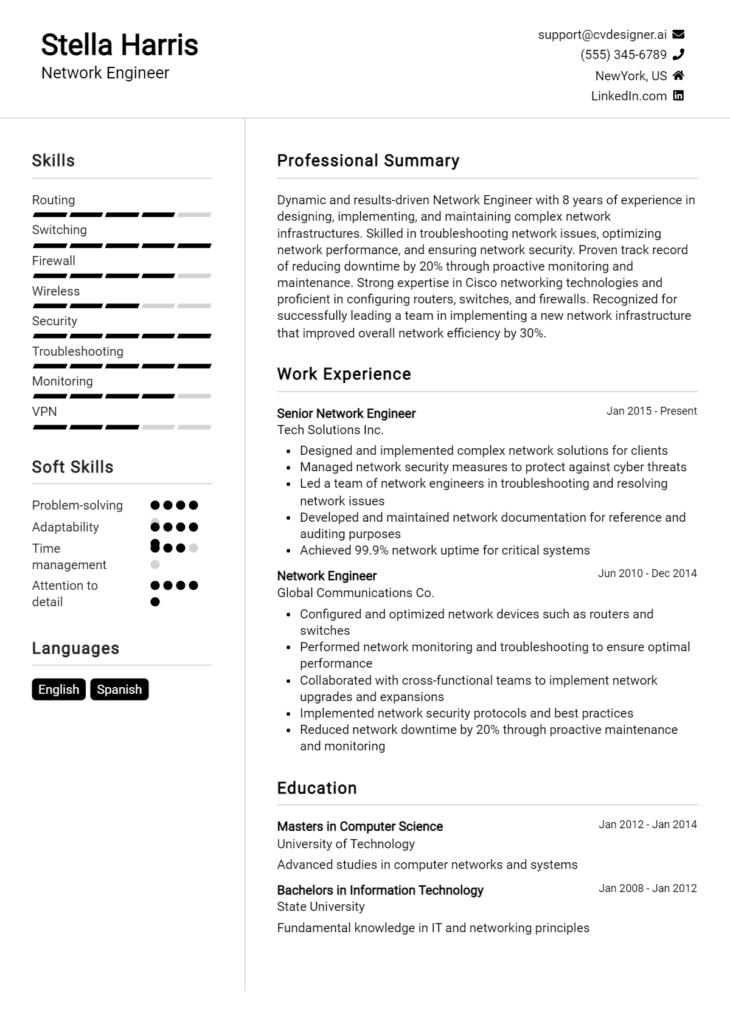Most Popular Network Security Consultant Resume Examples
Explore additional Network Security Consultant resume samples and guides and see what works for your level of experience or role.
In today's digital landscape, the role of a Network Security Consultant is more critical than ever. As organizations increasingly rely on technology to drive their operations, the demand for skilled professionals who can safeguard sensitive data and defend against cyber threats has skyrocketed. A well-crafted resume is your first line of defense in securing interviews and landing your dream job in this competitive field. It not only showcases your technical expertise and experience but also reflects your understanding of the industry's nuances. Whether you're a seasoned expert or just starting your career, having a standout resume can make all the difference in capturing the attention of hiring managers.
In this comprehensive guide, we will explore the essential components of an effective Network Security Consultant resume. You will learn about the key responsibilities and skills that employers look for, as well as the best formats to present your information. We will highlight common mistakes to avoid that could undermine your chances of success. Additionally, we will provide resume examples tailored for all experience levels—from entry-level to senior consultants—so you can find inspiration that resonates with your career stage. Finally, we will share invaluable tips for resume writing, including how to select the right resume templates that align with your personal brand and the specific demands of the cybersecurity industry. Prepare to elevate your resume and position yourself for success as a Network Security Consultant!
Key Responsibilities and Skills for a Network Security Consultant
A Network Security Consultant plays a critical role in safeguarding an organization’s network infrastructure. They are responsible for identifying vulnerabilities, designing security measures, and ensuring compliance with industry standards. Their expertise helps protect sensitive data and maintain the integrity of systems against cyber threats.
Key Responsibilities:
- Conduct risk assessments and vulnerability assessments to identify potential security threats.
- Develop and implement security policies, protocols, and procedures.
- Monitor network traffic for unusual activities and respond to security incidents.
- Collaborate with IT teams to design secure network architectures.
- Stay updated on the latest security trends, threats, and technology solutions.
- Provide training and support to staff on security best practices.
- Conduct penetration testing and security audits to evaluate the effectiveness of security measures.
- Prepare reports and documentation on security assessments and incidents.
Essential Skills:
- Proficiency in network security protocols and firewalls.
- Strong knowledge of intrusion detection and prevention systems (IDPS).
- Familiarity with risk assessment tools and methodologies.
- Ability to analyze complex security systems and identify vulnerabilities.
- Experience with security information and event management (SIEM) systems.
- Excellent problem-solving and critical-thinking skills.
- Strong communication skills for effective collaboration with non-technical stakeholders.
- Certifications such as CISSP, CISM, or CEH are highly desirable.
Highlighting these skills effectively in the resume skills section is crucial. Tailoring your skills and responsibilities to match the job description can significantly enhance your chances of standing out to potential employers. When crafting your CV, consider how these skills not only align with the required qualifications but also demonstrate your ability to contribute to the organization’s security objectives.
Best Resume Format and Structure for a Network Security Consultant
When crafting a resume for a Network Security Consultant position, it's essential to choose a format that highlights your technical expertise, professional experience, and relevant skills. Below is a detailed guide on the best resume format and structure for this role.
Contact Information
Start with your contact information at the top of your resume. Include:
- Full name
- Phone number
- Professional email address
- LinkedIn profile URL (if applicable)
- Location (city and state)
Professional Summary
Write a compelling professional summary that provides a snapshot of your qualifications and experiences. This section should be 3-5 sentences long and highlight your years of experience, key skills in network security, and any specialized areas of expertise. Tailor this summary to reflect the requirements of the job you are applying for.
Work Experience
List your work experience in reverse chronological order, starting with your most recent position. For each job, include:
- Job title
- Company name
- Location (city and state)
- Dates of employment (month and year)
- Bullet points outlining your responsibilities and achievements. Focus on quantifiable outcomes, such as how you improved security protocols or reduced vulnerabilities. Use action verbs to convey your contributions effectively.
Education
Include your educational background, starting with your highest degree. For each degree, provide:
- Degree type (e.g., Bachelor’s, Master’s)
- Major or concentration (if relevant)
- University name
- Graduation year
If you have relevant coursework or projects, consider adding a bullet point under each entry to showcase your expertise.
Skills
Create a dedicated skills section that lists your technical and soft skills relevant to network security. Be specific and include:
- Technical skills (e.g., firewalls, intrusion detection systems, VPNs, encryption protocols)
- Security certifications (e.g., CISSP, CEH, CompTIA Security+)
- Soft skills (e.g., analytical thinking, communication, teamwork)
This section should be easy to scan and can be formatted as a bulleted list.
Certifications
List any relevant certifications you hold that pertain to network security. Include:
- Certification name
- Issuing organization
- Date obtained (or expected completion date)
If you are pursuing additional certifications, you can mention them as “in progress.”
Tips for Resume Formatting
- Use a clean, professional font (e.g., Arial, Calibri) and maintain a font size between 10-12 points.
- Keep your resume to one page if you have less than 10 years of experience; two pages are acceptable for more extensive experience.
- Use clear section headings and consistent formatting (bold for job titles, italics for dates, etc.) to enhance readability.
- Avoid using excessive graphics or colors; a simple, organized layout is best.
Complementing Cover Letter Format
The format of your resume should align with the style of your cover letter. Use the same font and heading style for consistency. Your cover letter should introduce you and elaborate on specific experiences mentioned in your resume. It provides an opportunity to explain how your skills make you an ideal candidate for the Network Security Consultant role. Ensure that both documents reflect professionalism and attention to detail, which are critical in this field.
By following this structured approach and focusing on the key components, you'll create a resume that effectively showcases your qualifications as a Network Security Consultant.
Writing Tips and Best Practices for a Network Security Consultant Resume
When crafting a resume as a Network Security Consultant, it's essential to present your skills and experiences in a clear, concise, and professional manner. Start by tailoring your resume to match the job description, ensuring you highlight your relevant expertise in network security protocols, risk assessment, and incident response. Utilize action verbs to convey your accomplishments effectively, and quantify your achievements to demonstrate your impact. Incorporating industry-specific keywords will not only help your resume pass through Applicant Tracking Systems (ATS) but also resonate with hiring managers looking for particular qualifications. Consider using resume writing tips to enhance your document's overall presentation. Additionally, remember that the principles of effective writing apply equally to your cover letter, where you can further elaborate on your qualifications and enthusiasm for the role.
- Use action verbs such as "implemented," "analyzed," and "developed" to convey your proactive approach.
- Quantify your achievements by including metrics, such as "reduced security incidents by 30% over one year."
- Incorporate keywords specific to network security, such as "firewall management," "intrusion detection," and "risk assessment."
- Tailor your resume for each application, aligning your skills with the job requirements listed in the posting.
- Highlight relevant certifications, such as CISSP or CISM, to showcase your expertise and commitment to the field.
- Include a professional summary at the top of your resume that encapsulates your experience and key strengths.
- Keep formatting consistent with clear headings, bullet points, and an easy-to-read font to enhance readability.
- Proofread your resume multiple times to eliminate any grammatical errors or typos, ensuring a polished final product.
Common Mistakes to Avoid in a Network Security Consultant Resume
Crafting a compelling resume as a Network Security Consultant is crucial to standing out in a competitive job market. However, many candidates make common mistakes that can undermine their chances of landing an interview. Avoiding these pitfalls can help ensure that your skills and experience are presented effectively. Here are some of the most frequent mistakes to steer clear of:
- Overloading the resume with excessive information or jargon that can confuse the reader.
- Using generic descriptions that fail to highlight specific skills or achievements related to network security.
- Neglecting to tailor the resume for the specific job description and company.
- Failing to include measurable achievements that demonstrate the impact of your work.
- Using an unprofessional email address or format that detracts from your professionalism.
- Ignoring the importance of a clear and organized layout, making it difficult for hiring managers to navigate.
- Omitting key certifications and relevant training that are essential in the network security field.
- Not proofreading for spelling and grammatical errors, which can create a negative impression.
- Including irrelevant work experience that does not relate to the position.
- Not providing clear contact information or leaving out LinkedIn profiles that enhance your candidacy.
To further refine your resume and avoid these errors, consider reviewing the common mistakes to avoid in a resume. Additionally, ensure that your cover letter complements your resume effectively by steering clear of typical cover letter mistakes as well.
Checklist for a Network Security Consultant Resume
- Proofread for Typos and Errors: Carefully review your resume for any spelling or grammatical mistakes. Consider reading it aloud or using a text-to-speech tool for an additional perspective.
- Check for Consistency: Ensure consistent formatting throughout your resume. This includes font styles, sizes, and bullet point styles. Consistency helps in creating a professional appearance.
- Tailor Your Resume for the Job: Customize your resume for each position you apply for. Highlight skills and experiences that are particularly relevant to the job description.
- Use Action Verbs: Start bullet points with strong action verbs (e.g., "Implemented," "Managed," "Conducted") to clearly demonstrate your contributions and achievements.
- Quantify Achievements: Whenever possible, include numbers or percentages to quantify your accomplishments (e.g., "Reduced security breaches by 30% over two years"). This adds credibility and impact.
- Include Relevant Certifications: Make sure to list any relevant certifications (e.g., CISSP, CISM, CEH) prominently in your resume to showcase your qualifications.
- Optimize for Keywords: Use industry-specific keywords found in the job description to improve your chances of passing through Applicant Tracking Systems (ATS).
- Limit to Relevant Experience: Focus on the last 10-15 years of experience or the most relevant roles to keep your resume concise and impactful.
- Professional Summary: Include a brief, compelling professional summary at the top of your resume that encapsulates your experience, skills, and what you bring to the potential employer.
- Consider Using an AI Resume Builder: Utilize an AI resume builder to ensure all elements are well-organized and visually appealing. This can help streamline the design process and enhance your resume’s overall effectiveness.
For creating a CV or cover letter, you can follow a similar checklist to ensure professionalism and relevance.
Key Takeaways for a Network Security Consultant Resume Guide
In conclusion, crafting a strong resume as a Network Security Consultant is essential to stand out in a competitive job market. By utilizing the examples and tips provided in this guide, you can effectively showcase your skills, experience, and achievements to potential employers. To take the next step in your job application process, consider downloading a professionally designed template from our resume templates or a tailored cover letter template to complement your resume. Additionally, our user-friendly resume maker can streamline the creation process, ensuring your resume is polished and professional. Remember, following similar guidelines will also enhance your CV and cover letter, making them more compelling. For further assistance, check out our CV templates and learn how to write an effective cover letter. Start today, and take a significant step toward your dream role in network security!
